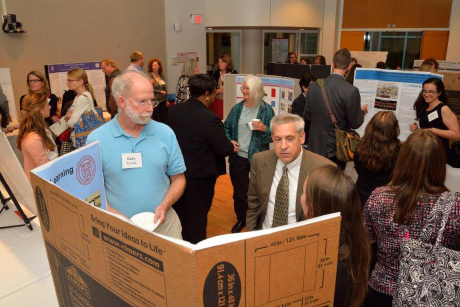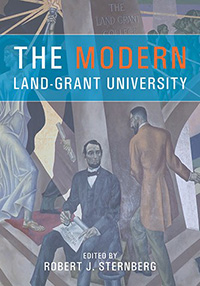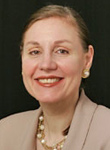Qi Wang, professor of human development, is quoted in the Dallas Morning News, September 14: "childhood memories have a long-lasting impact on how we behave," lending support to a new study finding that children who frequently wait in line are more likely to become impulsive spenders as adults. Read more
Author Archives: ktb1@cornell.edu
Funding renewed for aging and pain research center
By Ted Boscia
Reprinted from Cornell Chronicle, November 4, 2014
Cornell’s Translational Research Institute for Pain in Later Life (TRIPLL), a New York City-based center to help older adults prevent and manage pain, has received a five-year, $1.95 million renewal grant from the National Institute on Aging.
The institute, formed in 2009 as one of 12 national Edward R. Roybal Centers for Translational Research on Aging, studies innovative, nonpharmacological methods to ease persistent pain, which is estimated to afflict nearly half of older Americans. TRIPLL unites social and psychological scientists at Cornell’s Ithaca campus, Weill Cornell Medical College researchers and community-based health care partners.
With the grant renewal, TRIPLL adds a focus on behavior change science, seeking to apply insights from psychology, sociology, economics and communications to develop optimal pain management techniques. For instance, knowing how and why older adults decide on various medications, therapies, exercises and other methods to limit pain can help individuals and their caregivers to weigh their preferred treatments. TRIPLL investigators also plan to explore how new communication tools, including social media and smartphones, can be harnessed to manage pain.
“In spite of how widespread chronic pain is among older adults, there are relatively few tested interventions to help people reduce their pain,” said TRIPLL co-director Karl Pillemer, the Hazel E. Reed Professor of Human Development in the College of Human Ecology. “Our new focus is exciting because we hope to translate findings into more effective interventions by deepening our understanding of human behavior and decision-making.”
More than 100 million Americans suffer from chronic pain, more than those affected by heart disease, diabetes and cancer combined. Yet relatively few researchers study pain management, with most focusing on well-known diseases. But untreated pain takes a physical, mental, social and economic toll on older adults, according to TRIPLL co-director Cary Reid, the Irving Sherwood Wright Associate Professor of Geriatric Medicine at Weill Cornell.
“Treating pain in older patients is challenging in many ways,” Reid added. “There are few studies that enroll typical older patients that can help to guide management decisions. Older adults are more sensitive than younger adults to medication-related side effects, and many older individuals (along with their health care providers) believe that pain is supposed to be present in later life.”
Despite these challenges, Reid said that preventive approaches are critical to lessen the many negative consequences – such as reduced mobility, depression and anxiety, sleep impairment and social isolation – of poorly controlled pain.
In its first five years, TRIPLL has funded 30 pilot studies on innovative treatments, policies and interventions for improved pain management. More than 100 investigators – faculty members and graduate students – have been mentored by TRIPLL investigators, including presentations of their work at monthly work-in-progress seminars.
The institute will continue to have strong community roots, said TRIPLL co-director Elaine Wethington, professor of human development and of sociology. In Ithaca and New York City, TRIPLL researchers are partnering with health care providers, hospice and home nurse agencies and older adults themselves to match interventions to their needs. Its translational focus seeks to move evidence-based techniques directly into clinical practices, programs and policies.
“The involvement of community organizations in every aspect of research project development – from conceptualization, design, participant recruitment and eventual dissemination – is one of TRIPLL’s strengths” said Wethington. “The input of community agencies and consumers leads to research that is more likely to be implemented successfully in diverse cultural settings.”
Affiliated with Cornell’s Bronfenbrenner Center for Translational Research, TRIPLL includes collaborating investigators at Weill Cornell Medical College, Cornell University (Ithaca campus) and the Hebrew Home at Riverdale. TRIPLL also maintains ongoing partnerships with Columbia University, the Hospital for Special Surgery, Memorial Sloan Kettering Cancer Center, Visiting Nurse Service of New York, and the Council of Senior Centers and Services of NYC.
Ted Boscia is director of communications for the College of Human Ecology.
Related Links
TRIPLL
College of Human Ecology
Weill Cornell Medical College
New study shows how teens can be taught to act more rationally
Valerie Reyna's new study investigating alternative interventions to nudge adolescents toward safer behavior was featured in the online forum Big Think. Results of the study suggest that teaching students the “gist” of how to act in a given situation is significantly more effective than just giving them the tools to weigh risks using their own powers of rationality. Read more
Steve Ceci wins Thorndike award for lifetime research
By Susan S. Lang
Reprinted from Cornell Chronicle, August 28, 2014
Stephen J. Ceci, the Helen L. Carr Professor of Developmental Psychology in the College of Human Ecology, is the winner of the 2014 E.L. Thorndike Award for Lifetime Contribution in Research from the American Psychological Association (APA).
The award letter noted that he was chosen “from a list of outstanding nominees” and that his career has been “laden with the kind of excellent achievements that those of us who work in the field of educational psychology value highly. It is clear that your program of research has both theoretical and practical value to the larger educational, psychological and legal communities. Your work in several areas, from your bio-ecological theory of intellectual development and your groundbreaking work on children’s suggestibility to your more recent work examining women’s and girls’ achievement in science, has had a major impact on several fields, including educational psychology.”
Ceci received the award at the APA’s annual convention Aug. 7-10 in Washington, D.C.
The prestigious award, which has honored such icons in the psychology world as Jean Piaget, B.F. Skinner and Albert Bandura, was also won by Robert Sternberg, who joined the faculty of Cornell’s Department of Human Development earlier this year, making “Cornell's Department of Human Development the only department in the world with two living Thorndike winners on its faculty,” said Ceci.
Ceci, the author or co-author of more than 400 academic publications, most recently won the 2013 Distinguished Scientific Contributions to Child Development Award, from the Society for Research in Child Development. He is one of the most cited developmental psychologists – 35 of his articles and books have been cited more than 100 times each. All told, his work has been cited about 22,000 times, according to Google Scholar, with an H index of 63 (meaning that 63 of his articles have each been cited at least 63 times).
In the award nomination, Ceci’s seminal scientific contributions were noted in the areas of everyday intelligence (with the late Cornell professors Urie Bronfenbrenner and Ulric Neisser), sex differences in mathematical ability (with Cornell professor Wendy M. Williams) and the reliability of child witnesses (with Maggie Bruck of Johns Hopkins University).
Ceci came to Cornell in 1980 and has since received lifetime distinguished scientist awards from the APA and the Association for Psychological Science, among numerous other awards.
Related Links:
Cooperative Extension interns report on statewide research
By Caitlin Harder
Reprinted from Cornell Chronicle, October 20, 2014

Pawan Angara discusses his spotted wing drosphila research with College of Agriculture and Life Sciences Dean Kathryn Boor. - Mark Vorreuter
On Oct. 7, 26 students from the College of Agriculture and Life Sciences (CALS) and College of Human Ecology (CHE) gave one-minute “lightning” presentations on topics ranging from helping New York farmers adapt to climate change to market testing alternative sap products and offering classes to second-time parents.
The presentations were followed by a poster session that outlined what the students learned through research conducted during the Cornell Cooperative Extension Summer Internship Program.

Human Ecology Dean Alan Mathios and faculty member Gary Evans mingle with the Cornell Cooperative Extension interns. - Mark Vorreuter
Pawan Angara ’16 conducted research on spotted wing drosophila, an invasive species that lays its eggs in otherwise viable fruit, creating significant losses for organic farmers in the Hudson Valley. Angara spent his summer developing a gel that attracted the insects to a location where they could be exterminated.
Angara discovered that field research doesn’t always go as planned. “You have to adapt and work with the tools you have on hand, rather than what you wish you had,” he said. “I definitely was inspired by all the innovation I saw in the lab and the quick thinking that went on. When you’re in the field, you can’t just drive back to the lab to get something you forgot.”
This was his second summer participating in the program. “Every year I see more and more people doing great things for the community and great things for the world through research,” he said.
Lindsay Dower ’15 updated a curriculum on nutrition and fitness and taught modules to middle school children in Canandaigua. Applying the research of Valerie Reyna, professor of human development, Dower tested a theory that learning by understanding overarching ideas is more effective than memorizing facts. “I learned so much about the research process and, beyond that, how to work with different groups and types of people … and I definitely strengthened my leadership skills,” Dower said. She is continuing her research in Reyna’s Laboratory for Rational Decision Making this academic year.
Food science major Susana Jimenez ’15 spent her summer in Wayne County working to increase participation of traditionally underrepresented Latino children in local educational opportunities. Building on the research of CHE senior lecturer Pilar Parra, Jimenez conducted interviews and focus groups and learned that parents and caregivers in the rural area showed high interest in extension programs. She identified and evaluated sites, learning that hosting programs in familiar spaces with established community leaders, such as Catholic churches, increased program participation. She said these groups wanted to learn about nutrition and food safety, but they were open to many of kinds of programs. “It’s not so much what you teach, but where and how,” she said.
Since its establishment in 2007, the Cornell Cooperative Extension Summer Internship Program has expanded from five student projects to 26.
Caitlin Harder is a writer intern for Cornell Cooperative Extension.
Valerie Reyna comments on the rising fear of Ebola
Valerie Reyna, professor of human development in Cornell's College of Human Ecology commented recently on the rising fear of Ebola in the United States for the PBS News Hour, the Huffington Post, and for the Cornell Press.
“The layperson’s perception of risk from Ebola is understandable from a psychological perspective. People often think in terms of categorical possibilities—especially about horrifying possibilities. They are told that transmission is categorically impossible, then the impossible happens--twice. Two healthcare workers get infected. Suddenly, the impossible becomes possible and people are naturally fearful."
“It is crucial to understand the public’s perception of risk as an integral part of public health efforts to control infections, whether those infections are HIV, HPV and its vaccine, or Ebola. The science of human perception and behavior cannot be ignored because it is a key part of keeping the nation safe.”
For PBS newshour, October 16, 2014, she elaborated: "now, psychologically, people have shifted from, this is an impossibility to, not only is it a possibility, but it’s one that’s increasing. And the human mind is keenly attuned to change, to increases in risk, as well as changes from impossible to possible."
Fear actually spreads from person to person similarly to how a physical virus is transmitted, Reyna said in her interview with Huffington Post, October 17, 2014. And if a risk is unfamiliar to us -- something that we've never experienced and may not understand the actual of level of risk associated -- it tends to produce more dread, says Reyna.
Related Link:
Loeckenhoff reaps early career award in gerontology
Reprinted from Cornell Chronicle, August 13, 2014
Corinna Loeckenhoff, associate professor of human development, is the 2014 recipient of the Margret M. and Paul B. Baltes Foundation Award in Behavioral and Social Gerontology from The Gerontological Society of America (GSA) – the nation’s largest interdisciplinary organization devoted to the field of aging.
This annual award, which Loeckenhoff will receive at GSA’s 67th Annual Scientific Meeting, Nov. 5-9 in Washington, D.C., recognizes outstanding early career contributions in behavioral and social gerontology.
Loeckenhoff directs the Laboratory for Healthy Aging in the College of Human Ecology at Cornell. She has published more than 35 refereed journal articles, many in the flagship journals in psychology and aging. Her groundbreaking research revolves around age differences in socio-emotional functioning and their implications for health-related decision-making and outcomes. Recently she has focused on translating findings from laboratory-based decision-making paradigms to real-world health care settings.
Her work also has major implications for understanding barriers to optimal decision-making among older adults and their family members who face challenging choices in the face of life-threatening illnesses. Her research program focuses on the role of stressful life events, social relationships, and balancing present and future well-being.
Her work, at an early career stage, has contributed to understanding age differences in time horizons, personality and emotion. In addition, she has done fundamental research on lifelong trajectories in personality traits and social cognition. Particularly notable, Loeckenhoff’s work has shed new light on the impact of these phenomena on mental and physical health, with attention to cultural differences.
Loeckenhoff received her undergraduate degree from the University of Marburg in Germany (1999) and a Ph.D. in personality psychology from Stanford University (2004).
Related Links:
Summer 2014
 |
Study cracks brain’s emotional code The human brain turns feelings them into a standard code that objectively represents emotions across different senses, situations and even people, reports a new study by Cornell neuroscientist Adam Anderson. |
 |
Book lauds land-grant university model The land-grant university, 150 years after its inception, remains an extraordinary and compelling model for higher education, with ideas and ideals relevant to even the most elite academies, contends Robert Sternberg in “The Modern Land-Grant University.” |
 |
Book examines hows and whys of economic choices Drawing on perspectives from the early roots of psychology through the latest neuroscience, the new volume edited by Valerie Reyna and graduate student Evan Wilhelms introduces what we know about how and why people make decisions with economic consequences. |
 |
Poor neighborhoods – not poor parents – pack on pounds By age 2, poor children have gained more weight than those who are better off. But after age 2, neighborhood poverty, not family poverty, is linked to weight gain, finds a new study by Gary Evans. |
 |
Girls’ perceptions drive sexual behavior Jane Mendle’s latest research suggests that genetic factors related to how sexually mature a girl thinks she is influence her sexual behavior, above and beyond her actual physical development. |
| Online avatar helps demystify breast cancer risk Valerie Reyna and colleagues developed a computer-based system using artificial intelligence designed to mimic one-on-one human tutoring to help women understand breast cancer genetics. |
|
 |
Kids’ earliest memories might be earlier than they think The very earliest childhood memories might begin even earlier than anyone realized – including the rememberer, his or her parents and memory researchers, according to new research by Qi Wang. |
 |
Survey: ‘Mostly heterosexuals’ have more health problems The largest minority on the sexual-orientation spectrum – the mostly heterosexuals, estimated at around 7 percent of the general adult population – report more health problems than heterosexuals and somewhat fewer than bisexuals finds a review by Ritch Savin-Williams. |
 |
Institute for the Social Sciences grants awards Nathan Spreng is among those who received research awards from the Insititute for the Social Sciences in the Fall of 2013 for research on Brain Network Dynamics. |
Students in the News
 |
Win or lose, this computer game teaches biology Andrew Jefferson, a graduate student in the field of human development, is spearheading development of video games to teach young people about science. |
 |
Undergrads convey their research prowess at forums More than 20 of the students presenting at the Cornell Undergraduate Research Forum were HD majors or worked with a professor in the department. |
More Stories
Experts offer new findings on youth at research update
Service-learning event honors student, faculty projects
Workshop offers roadmap to link research, practice
Moving beyond IQ
Expressions of fear and disgust aided human survival, study says
The aging brain network
Love is a story
New Resources
| Embryos, stem cells, human meaning and policy | |
| Media Literacy |
Study cracks brain’s emotional code
By Karene Booker
Reprinted from Cornell Chronicle, July 9, 2014

An illustration of the brain turns feelings and perceptions into a similar code. The color/object gradient represents valence (blue is bad, red is good) - Adam Anderson, Junichi Chikazoe
Although feelings are personal and subjective, the human brain turns them into a standard code that objectively represents emotions across different senses, situations and even people, reports a new study by Cornell neuroscientist Adam Anderson.
“We discovered that fine-grained patterns of neural activity within the orbitofrontal cortex, an area of the brain associated with emotional processing, act as a neural code which captures an individual’s subjective feeling,” says Anderson, associate professor of human development in Cornell’s College of Human Ecology and senior author of the study, “Population coding of affect across stimuli, modalities and individuals,” published online June 22 in Nature Neuroscience.
Their findings provide insight into how the brain represents our innermost feelings – what Anderson calls the last frontier of neuroscience – and upend the long-held view that emotion is represented in the brain simply by activation in specialized regions for positive or negative feelings, he says.
“If you and I derive similar pleasure from sipping a fine wine or watching the sun set, our results suggest it is because we share similar fine-grained patterns of activity in the orbitofrontal cortex,” Anderson says.
“It appears that the human brain generates a special code for the entire valence spectrum of pleasant-to-unpleasant, good-to-bad feelings, which can be read like a ‘neural valence meter’ in which the leaning of a population of neurons in one direction equals positive feeling and the leaning in the other direction equals negative feeling,” Anderson explains.
For the study, the researchers presented 16 participants with a series of pictures and tastes during functional neuroimaging, then analyzed participants’ ratings of their subjective experiences along with their brain activation patterns. To crack the brain’s emotional code and understand how external events come to be represented in the brain as internal feelings, the researchers used a neuroimaging approach called representational similarity analysis to analyze spatial patterns of brain activity across populations of neurons rather than the traditional approach of assessing activation magnitude in specialized regions.
Anderson’s team found that valence was represented as sensory-specific patterns or codes in areas of the brain associated with vision and taste, as well as sensory-independent codes in the orbitofrontal cortices (OFC), suggesting, the authors say, that representation of our internal subjective experience is not confined to specialized emotional centers, but may be central to perception of sensory experience.
They also discovered that similar subjective feelings – whether evoked from the eye or tongue – resulted in a similar pattern of activity in the OFC, suggesting the brain contains an emotion code common across distinct experiences of pleasure (or displeasure), they say. Furthermore, these OFC activity patterns of positive and negative experiences were partly shared across people.
“Despite how personal our feelings feel, the evidence suggests our brains use a standard code to speak the same emotional language,” Anderson concludes.
The study was funded in part by a postdoctoral fellowship from the Japan Society for the Promotion of Science and was co-authored by Junichi Chikazoe, postdoctoral associate in human development at Cornell; Daniel H. Lee, University of Toronto; and Nikolaus Kriegeskorte, University of Cambridge.
Karene Booker is an extension support specialist in the Department of Human Development.
Related Links:
College of Human Ecology
Adam Anderson
The Paper
Book lauds land-grant university model
By Karene Booker
Reprinted from Cornell Chronicle, July 23, 2014
 The land-grant university, 150 years after its inception, remains an extraordinary and compelling model for higher education, with ideas and ideals relevant to even the most elite academies, contends Professor Robert Sternberg in his edited volume, “The Modern Land-Grant University” (Purdue University Press).
The land-grant university, 150 years after its inception, remains an extraordinary and compelling model for higher education, with ideas and ideals relevant to even the most elite academies, contends Professor Robert Sternberg in his edited volume, “The Modern Land-Grant University” (Purdue University Press).
“Land-grant institutions perhaps best represent the very core of what greatness means in American society – namely, equal opportunity for all and, through it, the chance to make our society and the world a better place,” says Sternberg, professor of human development in Cornell’s College of Human Ecology.
“Land-grant universities are about educating students, not just to be knowledgeable and smart, but also to be wise and ethical … to become future leaders, who will change the world in positive, meaningful and enduring ways,” he says.
The book provides a current and comprehensive review of the role and function of land-grant institutions, with four sections exploring the core mission, environment, public value and accountability of the modern land-grant university. The volume’s 20 chapters feature perspectives on teaching, research and outreach; undergraduate and graduate academic experience; economic development and entrepreneurship; diversity; promotion and tenure; and more. Sternberg’s epilogue concludes the volume with a summary of the values underlying the activities of land-grant institutions.
“The Modern Land-Grant University” offers university administrators, trustees, educational policymakers, faculty and staff not only a vision for higher education founded on the commitment to public service, but also practical insights for navigating today’s challenges.
Karene Booker is an extension support specialist in the Department of Human Development.
Related Links:
College of Human Ecology
Robert Sternberg
"The Modern Land-Grant University"


